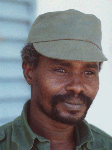

Human Rights Watch - Français
Afrique: Grands Lacs
Etablir une Cour Criminelle Internationale Efficace
L'affaire Habré
A propos de Human Rights Watch
Recherche
Rapports de Human Rights Watch
| The New York Times | Communiqués de presse |
Justice Denied in Senegal
The New York TimesEditorial Desk; Section A
07/21/2000
Page 18, Column 1
c. 2000 New York Times Company
Six months ago the Pinochet precedent spread to Africa when Senegal decided to try the former dictator of Chad, Hissene Habre, on charges of torture. It was the first time an African country had brought human rights charges against another nation's head of state, and it energized democracy activists -- and terrified other former tyrants -- across the continent. But Senegalese courts have now dropped the charges after what looks suspiciously like interference from the country's new president. Chad's torture victims have appealed. Their plea should be heard by a court independent of executive branch pressure.
Mr. Habre ruled Chad for eight years with the backing of France and the United States, which supported him as a counter to the Libyan leader, Muammar el-Qaddafi. Mr. Habre's regime killed thousands of people, and hundreds of thousands may have been tortured. He was overthrown in 1990. Since then he has lived in Senegal.
His comfortable exile was disturbed when he was arrested in February, after a group of torture victims came to Senegal to testify. Judge Demba Kandji's indictment was based on Senegal's ratification of the Torture Convention, which obliges states to prosecute or extradite alleged torturers no matter where the crimes took place.
In March, however, Abdoulaye Wade was elected president of Senegal. Mr. Wade apointed Mr. Habre's attorney, Madicke Niang, as a special adviser. President Wade also headed a panel that removed Judge Kandji from the case. The president of the Indicting Chamber, the body that released Mr. Habre, was promoted while his chamber was deliberating the matter.
The chamber's decision that Senegal had no jurisdiction to prosecute torture abroad is particularly disappointing because Senegal enjoys one of Africa's most independent judiciaries. It was the first nation to ratify the International Criminal Court, and its lawyers hold prominent positions in judicial and human rights organizations worldwide. If it tried Mr. Habre, Senegal could make a signal contribution to human rights on a continent that has suffered more than any other from murderous leaders and the absence of the rule of law.
 © 2000 Corbis-Sygma L'ancien Président tchadien Hissène Habré |
|
|
Documents juridiques Dans la presse |
|
|
|
|
|
|